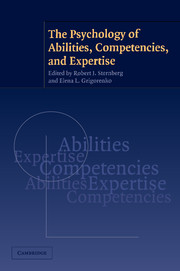Book contents
- Frontmatter
- Contents
- Preface
- List of Contributors
- The Psychology of Abilities, Competencies, and Expertise
- 1 Trait Complexes, Cognitive Investment, and Domain Knowledge
- 2 Intelligence as Adaptive Resource Development and Resource Allocation: A New Look Through the Lenses of SOC and Expertise
- 3 Developing Childhood Proclivities into Adult Competencies: The Overlooked Multiplier Effect
- 4 The Search for General Abilities and Basic Capacities: Theoretical Implications from the Modifiability and Complexity of Mechanisms Mediating Expert Performance
- 5 On Abilities and Domains
- 6 Expertise and Mental Disabilities: Bridging the Unbridgeable?
- 7 The Early Progress of Able Young Musicians
- 8 Expertise, Competence, and Creative Ability: The Perplexing Complexities
- 9 Biological Intelligence
- 10 What Causes Individual Differences in Cognitive Performance?
- Index
- References
1 - Trait Complexes, Cognitive Investment, and Domain Knowledge
Published online by Cambridge University Press: 05 June 2012
- Frontmatter
- Contents
- Preface
- List of Contributors
- The Psychology of Abilities, Competencies, and Expertise
- 1 Trait Complexes, Cognitive Investment, and Domain Knowledge
- 2 Intelligence as Adaptive Resource Development and Resource Allocation: A New Look Through the Lenses of SOC and Expertise
- 3 Developing Childhood Proclivities into Adult Competencies: The Overlooked Multiplier Effect
- 4 The Search for General Abilities and Basic Capacities: Theoretical Implications from the Modifiability and Complexity of Mechanisms Mediating Expert Performance
- 5 On Abilities and Domains
- 6 Expertise and Mental Disabilities: Bridging the Unbridgeable?
- 7 The Early Progress of Able Young Musicians
- 8 Expertise, Competence, and Creative Ability: The Perplexing Complexities
- 9 Biological Intelligence
- 10 What Causes Individual Differences in Cognitive Performance?
- Index
- References
Summary
The study of expertise has a long and varied history across over one hundred years of modern psychology. Along the way, various approaches and perspectives have been applied to examination of two central questions: “Who becomes an expert?” and “How does one become an expert?” Traditional experimental psychology researchers have focused on describing the processes involved in acquisition of expert performance (for example, Bryan and Harter, 1899), or on specifying the methods one should adopt for successfully acquiring expert performance (for example, James, 1890/1950). In contrast, traditional differential psychology researchers have focused on differentiating individuals from some specified group (for example, novices) who will acquire expertise during the course of training or job tenure from those who will fail to acquire expertise, given the same exposure. Researchers from a third perspective, which is best characterized as an “interactionist” approach, have attempted to build representations that consider both trait differences and childhood and adulthood experiences as spurs to the development of expertise (for example, Snow, 1996).
The focus of our discussion in this chapter is mainly on the differential and interactionist approaches. That is, we seek to understand the development of expertise as an interaction between individual characteristics (abilities, personality, interests, self-concept, and so forth) and the environment, as jointly influencing which persons develop expertise and which persons do not. In addition, we concern ourselves with the direction of investment of cognitive resources, which in turn determines the domains of expertise that are developed.
- Type
- Chapter
- Information
- Publisher: Cambridge University PressPrint publication year: 2003
References
- 14
- Cited by



